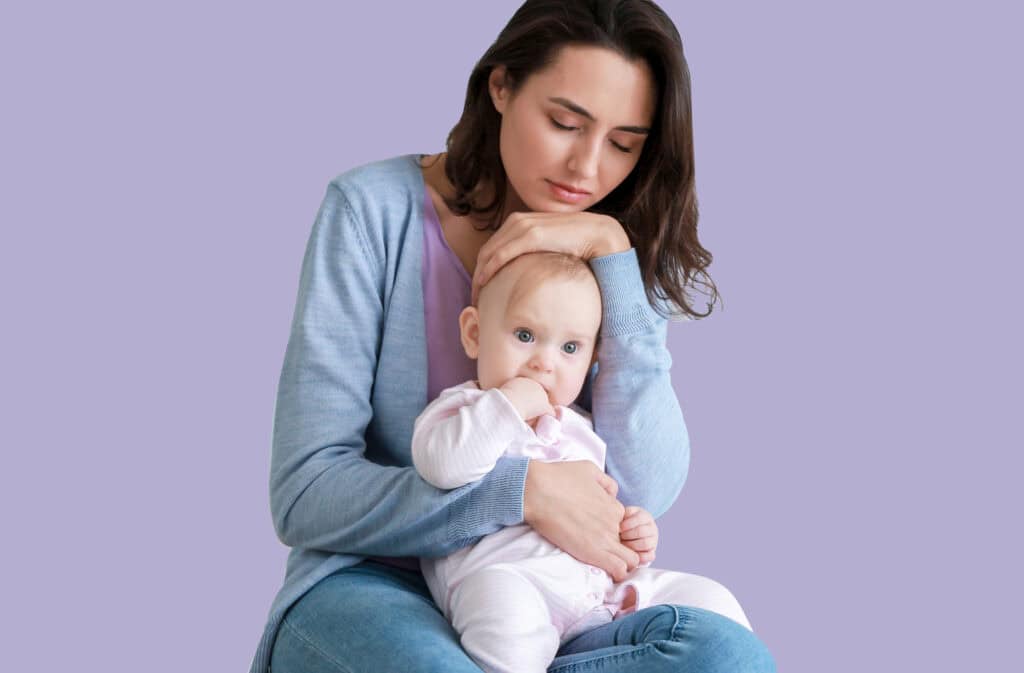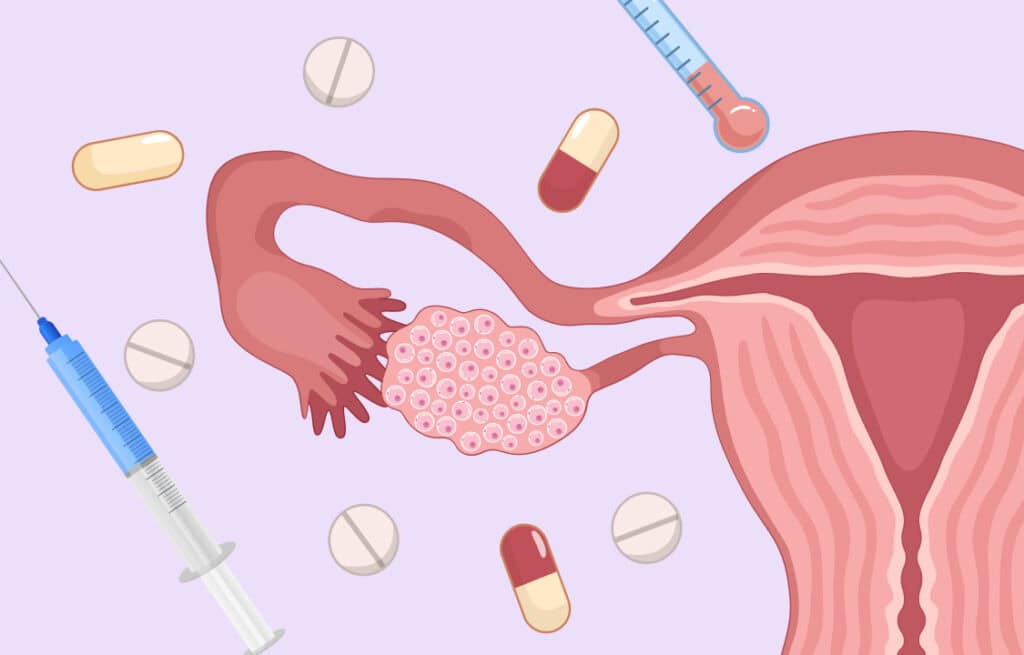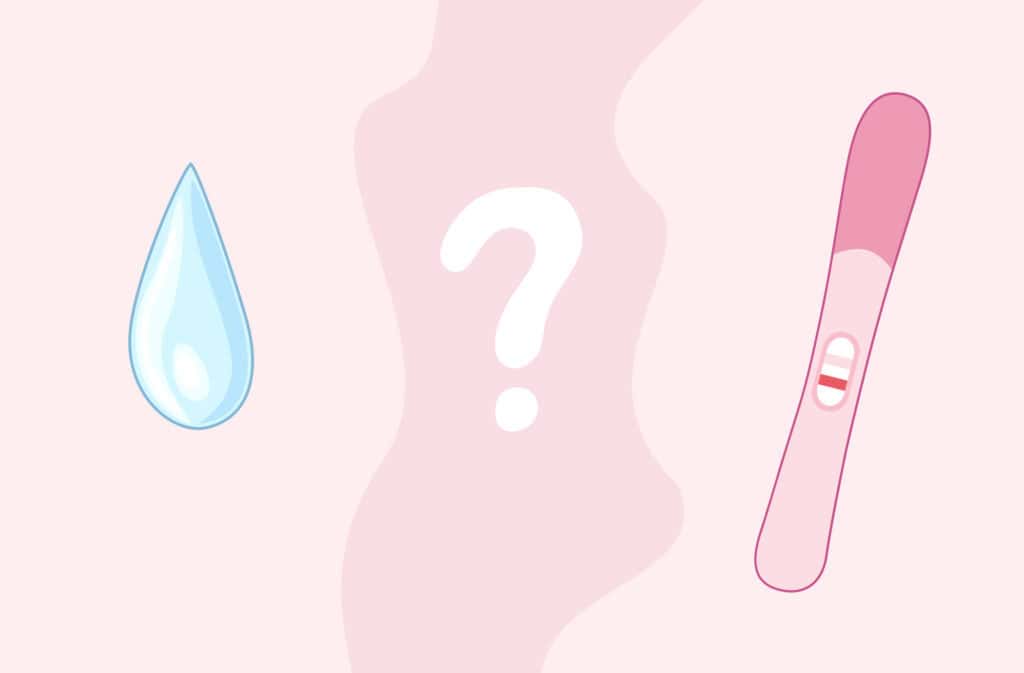Femia > Health Library > Being a mom > Recovering from birth > Postpartum anxiety: Symptoms, causes, and how to get help
Postpartum anxiety: Symptoms, causes, and how to get help

- Updated Feb 11, 2025
- Published
CRAFTED BY HUMAN
Crafted by human At Femia, we provide accurate and up-to-date information at every stage of your journey, from trying to conceive, pregnancy and postnatal support. All content is created by a real person based on in-depth research and own professional experience. Femia ensures that you will receive expert advice, strict accuracy and a personalized approach from our authors/medical experts. Learn more about our editorial policy.
FACT CHECKED
Fact checked At Femia Health, we maintain the highest standards of editorial excellence in delivering content focused on helping you conceive, guiding you through pregnancy, and supporting you postpartum. Explore our content review principles to learn how we ensure the accuracy and quality of our health and lifestyle tips for every stage of your journey.
Postpartum anxiety is a severe and persistent worry women experience after childbirth, and it is different from “baby blues” or postpartum depression. Symptoms can be both mental and physical, with the most popular ones being:
- Excessive fear
- Intrusive thoughts
- Hypervigilance
- Racing heart
- Difficulty sleeping or concentrating
Causes range from hormonal changes and sleep deprivation to past trauma and feeling overwhelmed by responsibilities. Treatment includes therapy, medication, relaxation techniques, and building a support network.
Although having a child can be a thrilling experience, new mothers experience many life changes as soon as the baby arrives. Quiet nights quickly turn into running around the house, calming the crying baby, changing diapers, and still trying to manage day-to-day tasks.
The feelings of heaviness and self-doubt about being a capable parent – which can grow to become intense and disruptive – are known as postpartum anxiety. These feelings are incredibly common, and almost every woman has experienced them with varying levels of intensity.
However, with the rise in mental health awareness and reduction in pressure on new mothers to juggle everything without admitting to experiencing stress, it’s now better understood that postpartum anxiety is not something to be ashamed of and can absolutely be treated with professional help. Now, let’s learn what postpartum anxiety is, how to recognize its symptoms, its causes, and when to seek professional help.
Femia offers the most accurate tool for tracking postpartum symptoms,
determining ovulation and fertile days
What is postpartum anxiety?
Postpartum anxiety is when a new parent experiences severe stress after the birth of their child. While stress is manageable in the majority of cases, sometimes it can take control and seem to overwhelm rational thought. Stress is to be expected after the birth of a child, but postpartum anxiety can be all-consuming and make new mothers worry all day and night, significantly diminishing their overall well-being.
Anxiety causes new parents to have irrational fears or excessive worries about events that are unlikely to happen. In some cases, anxiety can be caused by a specific incident from the past, but most often, the worry is something more vague and general. Postpartum anxiety can also come paired with postpartum depression. While these conditions are different, they can manifest together and they share many of the same symptoms.
PPA pregnancy: Does postpartum anxiety start during pregnancy?
Postpartum anxiety (PPA) can start during pregnancy since it is a period that is already filled with significant physical, emotional, and hormonal changes. This anxiety may come from, among other causes, fears about giving birth, one’s parenting ability, or the baby’s health.
Anxiety disorders that existed before pregnancy or major causes of stress such as high-risk pregnancies can amplify these feelings. Recognizing the signs and causes of anxiety early and getting prompt help is key, as untreated anxiety may persist and escalate in the postpartum period.
👉Find out more: The 5-5-5 postpartum recovery: What it is and how it helps
Signs and symptoms of postpartum anxiety
Now let’s go through the key postpartum anxiety symptoms that you should watch for and consider seeking help for:
- Persistent worrying or fear: this could be thoughts about the baby’s health, safety, or well-being, as well as a constant fear of making mistakes during pregnancy and caregiving, and stressing over unlikely possibilities.
- Physical symptoms: postpartum anxiety can be felt in the body and include symptoms like a racing or pounding heartbeat, shortness of breath, digestive issues like nausea or loss of appetite (not linked to toxicosis), headaches, and unexplained aches and pains.
- Difficulty sleeping: insomnia or trouble falling asleep, waking up frequently to check on the baby, or feeling fatigued even after a sufficient night’s rest.
- Hypervigilance: this can be an exaggerated sense of alertness, or constant scanning for potential dangers. You may also notice yourself over-monitoring the baby, frequently checking to see if the baby is breathing during the course of the night.
- Intrusive thoughts: these involve unwanted, disturbing ideas and images. You may experience frightening thoughts of losing control or accidentally harming the baby.
- Avoidance behavior: you may prefer to avoid activities out of fear of something bad happening, like leaving the house or driving with the baby.
- Difficulty concentrating: sometimes postpartum anxiety makes it almost impossible to focus on tasks or follow through with plans.
When does postpartum anxiety start, and how long does It last?
Postpartum anxiety may start during pregnancy or soon after the delivery. It often starts within the first few weeks of childbirth, but it may also develop later, anytime within the first year. In some women, symptoms may overlap with postpartum depression or other mood disorders, making it harder to isolate the symptoms of postpartum anxiety.
For those wondering how long does postpartum anxiety last – with no treatment or psychological help, anxiety can persist for weeks, months, and even years. Untreated anxiety negatively impacts a mother’s quality of life and her bond with the baby. However, with timely intervention, such as therapy, medication, or support groups, most women experience significant improvement.
Factors like a supportive network, self-care routines, and early identification play a valuable role in recovery. Mothers should reach out for help when they start to notice signs of postpartum anxiety to help prevent problems from exacerbating.
Causes of postpartum anxiety
There is no one cause for postpartum anxiety. However, there are several factors that may lead to anxiety during pregnancy and after birth. Here are a few of them:
- Hormonal changes: the sudden drop in hormones once the baby is born can cause changes in mood or cause you to overreact to stress. Knowing how to manage hormones can help you.
- Lack of sleep: caring for newborns is a full-time job that can involve many, sleepiness nights. This can be a source of stress, making it harder for new mothers to think rationally.
- Feelings of high responsibility: some women may be overwhelmed with the feeling of being responsible for another’s life.
- Stressful events or trauma: certain events or previous traumas may trigger postpartum anxiety. For example, breastfeeding issues or stressful delivery could be reasons for anxious thoughts.
If you had health issues, depression, or anxiety before becoming pregnant, these may also increase your chances of having postpartum anxiety.
Femia offers the most accurate tool for tracking postpartum symptoms,
determining ovulation and fertile days
When to seek help for postpartum anxiety
Recognizing when to seek professional help for postpartum anxiety will help ensure both the parent’s and the baby’s well-being. While occasional anxiety is a normal part of adjusting to parenthood, persistent or severe symptoms may require additional support. Consider reaching out to a healthcare professional if:
- Symptoms interfere with daily life or bonding with the baby: sometimes anxiety makes it almost impossible to provide proper care for a baby, to complete everyday tasks, or to simply enjoy bonding moments. Anxious feelings like being constantly preoccupied, overly worried, or detached from your baby are signs of postpartum anxiety and you should seek medical help.
- Postpartum anxiety leads to physical symptoms or panic attacks: experiencing physical symptoms alongside anxious thoughts is an indication of postpartum anxiety. Watch for symptoms like a racing heart, postpartum dizziness, chest tightness, sweating, or overwhelming feelings of panic – these are strong indications that you might need professional intervention.
If the weight of anxiety feels unmanageable or leads to feelings of hopelessness, don’t hesitate to reach out. Struggling to cope is not a sign of failure but a sign that support is needed.
How to help postpartum anxiety
While medical help is essential in severe cases, there are also some actionable steps new mothers can take to help manage postpartum anxiety. These include:
- Practice relaxation techniques: consider adding activities like deep breathing (8 in and 8 out), progressive muscle relaxation, or guided meditation as they help to reduce stress and calm the mind. There are also some apps specifically designed for guided breathing and meditation to make the process easier.
- Build a strong support network: connect with family members, friends, or local support groups for new parents. Sharing your feelings and experiences can alleviate the burden of anxiety and remind you that you’re not alone.
- Try to set realistic expectations and ask for help: read stories, and discuss your thoughts with your family, friends, or psychologist to adjust your expectations about parenthood. Understand that it’s okay to ask for help to have more time for yourself.
- Prioritize sleep and self-care: sleep deprivation often exacerbates postpartum anxiety. Try accepting offers for help with the baby to catch up on rest, find moments for self-care, and enjoy a warm bath or something that helps you relax.
👉Find out more: Postpartum hemorrhoids: Causes, treatment, and tips for healing after childbirth
Postpartum anxiety treatment options
There are several options that healthcare providers can offer for postpartum anxiety treatment:
- Therapy: one of the most popular ways to treat postpartum anxiety is behavioral therapy. A psychologist or counselor can help you identify your thoughts, emotions, and behaviors, providing you with tools to manage anxious thoughts.
- Medication: in some cases, therapy is accomplished by medication for postpartum anxiety as it helps with the psychological and physical symptoms of the condition. These include selective serotonin reuptake inhibitors (SSRIs), serotonin-norepinephrine reuptake inhibitors (SNRIs), and the antidepressant mirtazapine.
- Social support: lastly, national postpartum support groups can also be used to treat postpartum anxiety. Talking with those undergoing the same things has been shown to greatly help people with their anxious thoughts and to adjust their views on parenthood.
Questions from the Femia community
Can postpartum anxiety affect bonding with my baby?
Yes, anxious thoughts can make it hard to enjoy bonding moments with a baby. Sometimes new parents may also project anxiety on a baby, struggling with their baby’s normal behaviors because of their high stress levels. Seeking treatment can help improve the connection.
Can dads or partners experience postpartum anxiety?
Yes, any caregiver may experience anxiety after the birth of a baby, although it's less common, dads may experience symptoms like anger, sudden outbursts, violent behavior, low motivation, irritability, and physical symptoms. It's best to seek medical help, but meditation, taking time off, and taking care of one’s basic human needs can help with moderate anxiety cases.
Does breastfeeding help or worsen postpartum anxiety?
For some women, breastfeeding can reduce anxiety due to hormonal effects, but for others, breastfeeding can be stressful and exacerbate postpartum anxiety.
Can postpartum anxiety go away on its own?
Mild cases can improve with time and with some of the self-care tips mentioned above, but professional help is often a better option and may be essential in cases of severe postpartum anxiety.
When does postpartum anxiety go away?
When treated either with therapy, medication, the help of social groups or various self-care options, postpartum anxiety can be gone within months. However, in some cases, it may take a bit longer.
The bottom line
Postpartum anxiety is a common but treatable condition affecting many new mothers. Symptoms can range from mild to severe, but seeking support—through therapy, medication, or self-help strategies—can make a significant difference. If anxiety interferes with daily life or bonding with your baby, don’t hesitate to contact a healthcare provider. You are not alone, and help is available.
References
- Cleveland Clinic. “Anxiety Disorders.” Cleveland Clinic, 2020, my.clevelandclinic.org/health/diseases/9536-anxiety-disorders.
- “High-Risk Pregnancy.” Yale Medicine, www.yalemedicine.org/conditions/high-risk-pregnancy.
- Mayo Clinic Staff. “Anxiety Disorders.” Mayo Clinic, Mayo Foundation for Medical Education and Research, 4 May 2018, www.mayoclinic.org/diseases-conditions/anxiety/symptoms-causes/syc-20350961.
- Mayo Clinic. “Insomnia – Symptoms and Causes.” Mayo Clinic, 16 Jan. 2024, www.mayoclinic.org/diseases-conditions/insomnia/symptoms-causes/syc-20355167.
- Mayo Clinic. “Selective Serotonin Reuptake Inhibitors (Ssris).” Mayo Clinic, 2024, www.mayoclinic.org/diseases-conditions/depression/in-depth/ssris/art-20044825.
- Mayo Clinic. “Serotonin and Norepinephrine Reuptake Inhibitors (SNRIs).” Mayo Clinic, 2019, www.mayoclinic.org/diseases-conditions/depression/in-depth/antidepressants/art-20044970.
- NHS. “About Mirtazapine.” Nhs.uk, 16 Feb. 2022, www.nhs.uk/medicines/mirtazapine/about-mirtazapine/.

Can you fly when pregnant? Click for an overview of flight safety during pregnancy, airline policies, and tips to ensure a smooth and safe flight!

Let’s learn what OHSS means, its mild and severe symptoms, medical and self-care treatment options.

What is precum? Find out everything you need to know about pre-ejaculatory fluid: when does precum occur and what is the chance of getting pregnant from precum?

